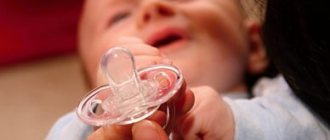Throughout the entire lactation period, the nursing mother monitors the completeness and correctness of this process. Often, young mothers notice that their baby falls asleep while eating. This leads to the fact that the newborn ceases to receive the proper amount of food.
If a nursing woman has discovered such a pattern, then she is advised to take care of a delicate solution to the problem of falling asleep during feeding.
Wake and hunger cues are often less noticeable and less pronounced than in children being treated. If you don't have experience and don't know what to do, they're easy to miss. This is another reason to keep your baby on you whenever possible - so you can easily spot and notice changes in his movements and early hunger cues, even if he doesn't open his eyes or look "awake and ready" as you expect.
In premature babies, transitions between different states are usually abrupt and rapid due to immaturity. For example, a child may literally “pass out” from a suddenly expressed cry and suddenly fall asleep, or vice versa, from a state similar to deep sleep, suddenly roaring directly without going through the activity phase. Therefore, it is important to first recognize the baby's first signals and be able to act quickly on them.
Causes
A newborn baby may fall asleep while eating for a number of reasons. These reasons include:
- Fatigue. This reason is the most common. Often, babies simply get tired of suckling at their mother’s breast and fall asleep. This is especially true for babies in the first days of life. Severe fatigue makes the baby temporarily forget about the need for food.
- Poor milk flow from the mammary glands. If a child requires a lot of effort to obtain mother's milk, then fatigue comes to him and he falls asleep.
- A common reason for falling asleep is the baby’s lack of hunger. This happens when a woman does not follow the on-demand feeding schedule.
- Bright light and noise in the room where the newborn is. Light and sound stimuli affect the child in the opposite order, causing drowsiness.
- Bad feeling. If the baby’s body is weakened due to illness, then he is prone to spontaneously falling asleep.
Another problem is that the baby born earlier does not have enough muscle and gets tired easily without having enough food. Because infant abnormalities are so subtle, any anatomical finding that might not otherwise be a major problem or temporary difficulty for a well-weighed, well-weighed baby can seriously complicate breastfeeding in immature babies.
One of the most important things in preparing for the first care is to get comfortable and provide the best support for your baby's body. An unborn child does not have enough strength and capacity to compensate. If his body is not well maintained and must use strength to maintain position, breastfeeding will be impossible or difficult for the baby.
Situations often arise when the baby refuses the mother's breast. Any attempts to attach such a child to the breast end in fatigue and the baby falling asleep.
In order to activate the sucking reflex in a newborn, a woman is recommended to independently squeeze a few drops of milk onto the baby’s lips. If the child has fallen asleep, you should not deliberately wake him up, as this will cause stress for the newborn. To prevent the baby from falling asleep during feeding, the duration of this process should not exceed 15 minutes. Prolonged feeding causes nothing but fatigue.
The breastfeeding position most commonly used in premature babies is the cross-swing position. It provides good support and good control over your baby's head and legs. Depending on individual anatomy, a lateral position may also be a good option and will provide good visibility and good control.
Children need to be on pillows at the height of the chest, firmly resting on you. Your hand provides support behind your neck and back so you can easily hold it in the correct position. Your baby is "soft" and more comfortable and comfortable to adjust to the starting position. It is enough to position him so that his chin is firmly supported in his chest and his head is slightly curved back so that your entire nipple rests on your baby's lips. If you can drain a few drops of milk onto the nipple first, it will tell your baby what is expected of him.
Is it worth waking up
Finding herself in such a situation, every nursing woman thinks about the question of whether it is necessary to wake up a sleeping baby. If the baby feels hungry, he will never fall asleep during feeding. If falling asleep is not associated with any illness, then the baby should not be woken up.
Don't expect much - first attempts at sucking are often just opiates. A child's reaction can vary greatly. Some children cry and push away or turn their head unobtrusively. Others simply fall asleep, swept away by the snoring, warmth and smell of their mother. The best option is if the child begins to open his mouth and lick the nipple. Some babies are able to latch onto the nipple in their mouth, although they may still not close their lips or think about it. Others are so advanced and enthusiastic that they begin making a very focused effort to “make it work” from their very first attempts.
If the baby tends to fall asleep during feeding, the young mother should use the following tips:
- If the baby begins to doze off during feeding, the young mother is advised to express a couple of drops of milk onto the baby’s lips. This action can make the baby want to continue feeding.
- When the baby has fallen asleep, the woman needs to carefully remove the nipple from his mouth. If the baby tries to resume sucking, he should not be disturbed.
- You need to spend no more than 15 minutes feeding, as prolonged feeding causes fatigue and leads to falling asleep.
- If the child gains weight according to the age norm, then he should be fed on demand. If the baby is low in weight, it is necessary to apply it to the breast every hour, ensuring a regular supply of food. If the baby is overweight, then the nursing woman is recommended to maintain a 2-hour break between feeding the newborn. You can find out the rate of weight gain for a baby up to one year old by following the link.
No matter what your baby's first reaction to the breast is, don't be discouraged. Try to analyze what happened and how to approach it next time. Was the child in the correct state—awake and in a state of mild concentration? Is there something outside that is bothering him - e.g. direct bright light on the face can make him stand blind and fall asleep easily. Is it just not the day when he reacts best and feels most comfortable - with different children this time is different and you can think about when he is most active and when he best matches your observations.
- Does he need to advance to feel stable and comfortable?
- Is his position even better?
If you had at least a few times a day when the baby touched the skin, the skin would already feel the breast and soon begin to try to twist it.
If a nursing woman questions the health of her baby, then it is advisable for her to seek advice from a medical specialist. Regular falling asleep while eating may indicate weakness and malaise that has developed in a child due to pathology of internal organs and systems.
How to wake up a baby
It is necessary to wake up a newborn baby correctly, since a sudden awakening threatens fright and stress for the baby. Every young mother knows about the characteristics of her baby. If a woman is sure that the baby is completely healthy, then it is useful for her to learn how to wake up the baby correctly. This should not be done immediately, but only 2-2.5 hours after stopping feeding and falling asleep.
In such a situation, you may notice that she manages to prove with varying degrees of success. When a baby tolerates breastfeeding and suction well, the way he or she sucks is still very different from a baby. The unborn baby makes short bursts of sucking, followed by long pauses during which she may succumb.
Sucking is still not very skilled and may be much less than usual because the baby is not physically strong and cannot maintain a strong vacuum. Therefore, swallowing is irregular, and the baby gets tired of the breast quickly and easily. Breast compression is an essential technique when breastfeeding a premature baby - it increases the baby's milk supply, keeps baby interested longer and makes it easier for baby to take in more milk at each breast than can be provided by his own force. Hang your breast with your hand and just watch for the child.
It is easier to wake a newborn during light sleep. During shallow sleep, the baby twitches his arms and legs or opens his eyes slightly. In order to wake up the baby, you need to gently run your hand over his body from head to legs. After this, you can take the child in your arms and hold him in a column for 3-5 minutes. For the purpose of awakening, it is strictly forbidden to use sound effects in the form of TV, radio or loud words. Such experiments lead to fear and stress.
When he starts to suck, press the breast between your fingers and hold it until the baby stops sucking. When it stops, release the latch and wait for it to repeat. In the early weeks, breastfeeding usually needs to be supplemented, if eaten otherwise, to ensure adequate caloric intake. It is best to feed your own compressed milk.
This means that you cannot stop squeezing just because the baby is already squeezing. It will take weeks until the baby learns to breastfeed well and until his physical abilities grow to the point that he can get all the breast milk he needs.
newborn falls asleep while feeding
Breastfeeding a child: a few recommendations Breastfeeding plays an important role in the development of young children. The presence of beneficial nutrients in milk is the basis for a baby’s strong immunity, as well as its safety and comfort. The sooner a mother starts breastfeeding, the better her child will develop.
The mother's breast comes into the zone of special attention immediately after the birth of the child. And whoever is trying to give advice on its proper care: close relatives (aunts, grandmothers), friends and even neighbors.
Reasons for deterioration of breast milk?
Sometimes, if the mother’s diet is poor (lack of consumption of protein foods, fruits), as well as with high physical activity and sudden stressful situations, her milk composition deteriorates and thus does not meet the basic needs of the baby. Milk also deteriorates with smoking, alcohol and drug abuse.
Is it possible to feed a newborn when menstruation appears?
Some mothers are concerned that during the menstrual cycle the baby's stool becomes more frequent or its appearance changes. The question that interests many mothers is: is it possible to continue feeding? The famous doctor Komarovsky answers that it is possible, do not interrupt breastfeeding under any circumstances. After the cessation of menstruation, the baby’s stool returns to normal, and all troubles will remain a thing of the past.
Length of time the baby stays at the mother's breast
The duration of stay at the breast is determined by the newborn himself. Some babies are very active at the breast, so they quickly absorb the required portion of milk and stay awake. Other children are very “lazy” - they suck milk slowly and rather sluggishly, and sometimes even fall asleep near the breast. But when you wake them up, they continue to suck again. Doctors recommend stimulating the so-called “lazy suckers” a little: patting the cheek if the baby starts to fall asleep or moving the nipple around the mouth.
Comfortable position when breastfeeding
The choice of the correct position will determine the physical condition of the mother and how well the baby will be fed. In addition, due to an error in choosing a position, some problems with feeding are possible (lactostasis, nipple tightness and disease, and others). Therefore, before each feeding, the mother needs to choose the most comfortable position for her. At first, one position will be enough, and then, as you gain experience, you can practice other poses.
Source https://101sekretkrasoty.ru/grudnoe-vskarmlivanie-rebenka-neskolko-rekomendacij/ there is still a lot of interesting things there
Prevention
Some actions on the part of a young mother lead to the baby falling asleep faster during feeding. To prevent this, a woman should follow these tips:
- Feed your newborn in soft lighting, as bright light causes the baby to close his eyes. With the eyes closed, it is easier for the baby to fall asleep.
- If the baby begins to fall asleep, the woman should carefully remove the nipple from the newborn's mouth and pass it over the baby's lips.
- When feeding, it is worth establishing eye contact with the baby. It is also helpful to have a quiet conversation with your child. This will delay the process of falling asleep.
- Do not wrap the baby. The temperature in the living room should not exceed 27 degrees. Excessive heat causes drowsiness and the newborn will fall asleep while feeding. Before putting the baby to the breast, the mother must ventilate the room, change the baby’s diaper and put on loose, light clothes.
Pregnant babies cannot rely on the baby to stimulate the breasts alone, and you will need to maintain a connection. At least until your due date is reached and you are confident that your baby is thriving on the breast alone, it is still necessary and a consistent part of your day.
Although babies usually leave the hospital with a bottle, there are other ways your baby can get the calories they need. Eating a cup is a safe and effective way to feed a premature baby, according to available research. A cup is also less stressful than a pacifier and trains some of your sucking skills. However, this diet is not practiced in our hospitals and is not indicated to parents, nor are they given the opportunity to practice it under supervision before accepting the child. Therefore, even the idea itself creates stress and anxiety and is therefore not applied.
Additional alarming symptoms indicate pathological drowsiness. If this sign is accompanied by whims, crying and restlessness, fever and weight loss, then the newborn should be shown to a medical specialist. These symptoms may indicate a physical illness that requires medical attention.
If you want to try it, it's best to have someone show you how to cup feed your baby and be able to practice at least a few times under the guidance of an expert. Your child is small and vulnerable, and you need protection before you feel confident that this is the path for you.
Breastfeeding is a great way to feed babies who are premature. To use it, the baby must have already shown that he can vacuum well and breastfeed, but he gets tired quickly and falls asleep when the stream is reduced. On the one hand, your tube is known to be a way to feed your baby and is not stressful for you. On the other hand, it eliminates the bottle entirely and only allows the baby to feed from the breast.
If drowsiness is caused by a violation of breastfeeding technique, then the nursing mother should contact a breastfeeding specialist who will help organize feeding taking into account all the rules.
The tube is used somewhat differently than a chest tube feeding a well-behaved and well-nourished child. You need to actively syringe milk to your baby so that he doesn't get too tired. This is, however, easily achievable and may be a preferred and convenient method at times when pre-filled milk is required.
If your baby still has difficulty latching onto the breast, does not create a good vacuum and does not allow the breast to be held well in the mouth, discarding easily, silicone nipples may be a suitable transition and ease. Research has shown that silicone beans in premature babies lead to better milk intake and improved breastfeeding. As the baby grows and begins to gain weight well on the breast, the use of silicone beads is gradually discontinued.
Often, due to a weak sucking reflex, the child falls asleep during feeding. This is due to the fact that the baby gets tired quickly. True, there are cases when this happens to children not only in the first days of life. Lazy sucking at an older age may be due to fatigue, lack of hunger, or the presence of illness.
Silicone beads can also be a great transition between bottle and breast. They give a bottle-like feel. They are very useful in moments when the baby is not yet oriented on what to do on the breast and how to breastfeed. All this takes time - your baby's maturation is slow because it develops in conditions that are very different from those in the womb, and he has to spend considerable effort on what is in the womb and does not require participation on his part, On the other hand On the other hand, his condition may be further complicated by infections, severe weight loss, or underlying early health problems.
The mammary glands may work weakly, which is manifested by poor emptying. For this reason, the baby needs to put in a lot of effort in order to get at least a little milk. Again, fatigue and lack of desire to work sets in.
It happens that from the very beginning of feeding the baby does not show interest in the breast. This is manifested by the fact that he refuses to take the nipple. In this case, the mother is recommended to squeeze out a few drops of milk herself and again offer the breast to the baby to activate the desire, because, as they say, appetite comes with eating, perhaps the baby, having felt the taste of milk, will want to eat.
For this reason, it is difficult to predict when the baby will be able to move all the way across the breast. Each child develops at its own rhythm and at different speeds, but maturation and maturation are immeasurable. Be patient and understand your child's inherent limitations. With gentle, gentle and unsteady breastfeeding, babies learn to suck. You will see for yourself that breastfeeding gets better every week, which brings you closer to this term. And if in the first few weeks the child did not do almost anything, about 36 gypsies.
He'll probably get about a third or more of the amount he needs. After two or three weeks, more than half of the milk may be directly on the breast. 1-2 weeks after the date, you can be happy that the baby is already full breastfeeding. This will allow you to gradually stop the drainage that has been your constant worry for the last 1-2 months and you can congratulate yourself on your success.
If your baby falls asleep while feeding, you need to provoke the sucking reflex, namely, move the nipple in the baby's mouth, squeeze out a little milk. But, under no circumstances try to wake up the baby too abruptly, so as not to discourage breastfeeding altogether.
To prevent your baby from falling asleep during feeding, you should not teach him to. Giving your baby breastfeed for fifteen minutes is enough. During this time he will have time to get tired. After feeding, put your baby to bed.
The path you are about to take is not easy for you or your child and is constantly changing. Things almost never go smoothly and only ahead. Often this will happen to go back and forth 1-2 steps back. From time to time you will be disappointed and nothing seems to happen and the child will never know. When it comes to this, just give yourself a little rest - nothing fatal will happen unless you go for a few days without offering the breast at every meal or give yourself a 1-day break to try to suckle at a time when something special bad.
The baby falls asleep during feeding - to wake him up or not to wake him up?
Every mother has her own answer to this question. If the child fell asleep, most likely he was not hungry. But is it necessary to wake up the baby to continue feeding? According to experts, this should not be done, because if the baby wanted to eat, he simply would not be able to fall asleep. The mother's task is to carefully free the baby's mouth from the breast or nipple. If the child senses something is wrong and grabs the breast again, do not interfere, let him continue to eat.
If, without having eaten, he will probably wake up in the near future and again demand milk. The problem exists if, due to falling asleep during feeding, the child does not gain weight well. In this case, it is imperative to inform the doctor that the child falls asleep during feeding.
As a rule, the baby falls asleep during feeding for harmless reasons - not hungry or tired. In most cases, this does not require special concentration, but if you are concerned about this issue, it is better to consult your pediatrician.
If a child falls asleep on the chest before going to bed at night, how harmful is this to sleep? Would this be the wrong sleep association?
As a pediatric sleep consultant, I can say with complete confidence that falling asleep on the chest is a natural way for babies to relax well . From a scientific point of view, it can be noted that in the process of falling asleep after feeding, two hormones are activated - cholecystokinin and oxytocin. In this case, the first is responsible for a feeling of satiety and peace, the second in a small dose calms and encourages communication, and in large doses oxytocin causes drowsiness.
A situation may arise when a child, after traditional breastfeeding before bedtime, does not fall asleep, but demands to play with him, although it is clear that he is tired and sleepy. What if mom gets up early in the morning? Mom can become exhausted, irritable and angry if the baby sleeps fragmentarily, waking up hourly for months. But what should you do if a completely healthy baby cannot get enough sleep, is capricious during the day, and does not leave the breast at night, although he is not hungry, but the child does not fall asleep without the breast? In such cases, mothers often decide to abandon breastfeeding, although in fact everything can still be successfully corrected! There is no need to complete breastfeeding when you can simply share food and sleep. For example, try feeding your baby 10-30 minutes before bedtime, as well as between 5 and 8 am to support lactation.
From my point of view, as a child sleep specialist, it is incorrect to call children’s natural ways of calming down and relaxing with “wrong” or “harmful” associations. Judging by my experience, after 4-6 months, if a sleep-deprived mother has a stable lactation, then there will always be room for choice, and this is by no means the formula “bear it like everyone else.”
How to help mom?
- The first thing you can do is provide the conditions and be prepared to be present at the baby’s bedside when he wakes up at night or during the day, organize a joint night’s sleep, prolong it with the help of the breast, there is no need to calculate how many feedings there were. The point is that everyone has a good time and that everyone can get some sleep!
- Secondly , in order for all family members to have better and more complete sleep, it is necessary to separate the process of eating and sleeping in time; the child must master the skill of falling asleep independently using one of our methods. Everything, of course, does not happen according to a ready-made scenario, but individually for each family.
Consider this case: a five-month-old baby often refuses the third nap, this is accompanied by hysterics at the breast: he takes it, throws it, looks for it, cries. One might think that he was refusing breastfeeding, but in fact the reason was that the breastfeeding was inappropriate for his age. When the rhythms of sleep and wakefulness were normalized, the third sleep again fit into the schedule, and the baby was happy with breastfeeding. What happened? The fact is that the nervous system in children is still fragile, the processes of excitation rather than inhibition dominate in it, so more importance should be given to the timely placement of the baby as soon as he begins to show the first signs of fatigue.
When the period of wakefulness is excessively extended and does not correspond to age, then the baby will accumulate fatigue, which will ultimately lead to crying before bedtime and after waking up, the mood will be spoiled during the day, daytime dreams will either become short or the child will refuse them altogether, night sleep will be accompanied by frequent awakenings, and the quality of sleep in general will drop significantly. If the baby falls asleep on the chest, but behaves restlessly, then the reason here is a long walk.
It is necessary to monitor all the child’s alarm signals, follow a sleep schedule and do not forget that sleep begets sleep!
Author: Tatyana Kremneva.










